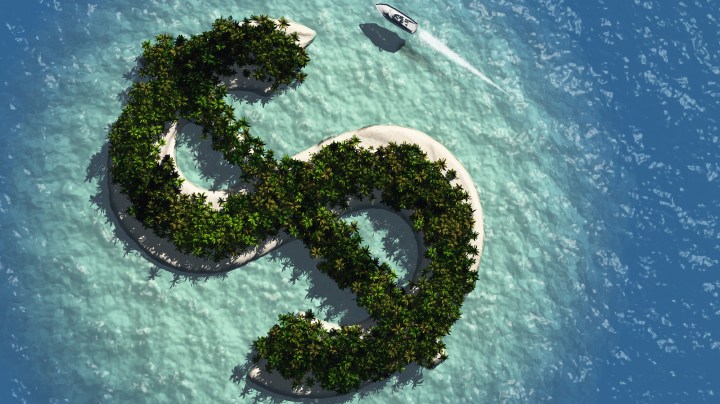GUEST ESSAY
The $103-trillion question — where do the filthy rich stash their cash?

It turns out that there are countries whose entire raison d’etre is to set up legislation and regulations to attract gobs of largely unscrutinised wealth from foreigners and then to obstruct any attempts by anyone, including superpowers, to get at it.
I love big numbers. Especially numbers that are so large that they sort of cease to have much meaning and just bloatedly sit there, being big. Basking in the amazed stares of impressed observers.
And so I give you $103-trillion.
Yes, $103-trillion.
That is the size of assets under the management of global wealth managers (according to Statista). You know, those unusually discreet professionals who take custody of rich people’s money and often construct fancy and mostly impermeable structures built of shells and trusts and foundations and the like, carefully spread across wealth-friendly jurisdictions that promise not to leak the details all over TikTok.
Read more in Daily Maverick: Are wary investors on the right track, moving money to cash?
I have no personal experience of having my wealth managed. Because my wealth, such as it is (or isn’t), wouldn’t even elicit a blink from any wealth manager worth their salt. How much do you need to get on to the absolute lowest, most discounted, and pathetic basement floor of the wealth management pyramid? About $5-million in net assets, not counting your home. And even then you might be an afterthought, lumped with a clump of other poor $5-million losers, your concerns attended to by your wealth manager perhaps once in a blue moon.
How do I know this? Because someone from deep within a subset of the general wealth management industry (that being the “offshore” wealth management sector) blabbed, and the details are delicious. But first, a caveat.
I know two people who are in this business reasonably well, one here, one abroad — both are among the nicest people I know. Not even normal nice. Determinedly and unrelentingly caring and moral in both their business and personal lives. So what follows is certainly not supposed to be a blanket indictment of the entire industry. But I became interested in this story while ruminating over the trillions that have disappeared from South Africa at the hands of politically connected crooks, and where the money ended up. There certainly would have been specialist skills required.
Anyway, here’s the story. In the early 2000s, a young US postgraduate student named Brooke Harrington was entering academia casting around for an interesting research subject in her area, sociology. Having grown up in upper-middle-class Chicago, she had become interested in some of her classmates who were from stratospherically rich families and was curious about the family money, where it came from and who took care of it, leading to an obsession about how investment operated. And so she decided that she was going to find out.
But she quickly found out that no one would talk to her about what is called “offshore” wealth management, jurisdictions where the ultra-rich send their money to privately luxuriate. The offshore business is tightly knit and famously closed-mouthed. A wealth manager from some island in the Caribbean who has a couple of whiskies and shares an anecdote about a profligate, cocaine-sniffing, hooker-bonking, tax-avoiding client is going to have a short career. And as an added incentive to zip-lip, in some countries, like Switzerland, indiscretions of this sort can attract both civil and criminal penalties.
So she decided on the only strategy available. Become a wealth manager, then maybe she could talk to her colleagues and get them to open up. She took two years off formal academia to attend Step in London, the gold-standard professional educational institution for wealth managers — sort of a combination of an MBA and a law degree. And eventually to the motherlode, a job as a wealth manager in New York City.
And then she was inside the house. Part of the family. Other wealth managers were now happy to talk to her. Some of them were more than that — eager to unburden. She was one of them. She was now an ethnographer, living among the natives, taking notes. She visited 18 wealth management centres and interviewed 65 practitioners over eight years. What emerged was remarkable, resulting in the publication of her book Capital without Borders: Wealth Managers and the One Percent (Harvard University Press).
(You can listen to an excellent interview with Brooke Harrington on Sean Carroll’s Mindscape podcast.)
Servicing tax cheats
The first astonishment was that while most of us invest whatever we can into products that we hope will get the best yield, or a value appreciation that exceeds inflation, that is not the goal of many offshore wealth managers. The goal is simply to protect the capital, keep it secret and keep it out of the hands of anyone who may make a claim. Predominantly the tax authorities. Most of the offshore wealth management business is focused on servicing tax cheats. Worse, many of these structures also exist to help to avoid having their clients pay off legitimate debts. Squirrel the money away in an offshore structure, declare bankruptcy, and your creditors cannot get it.
This last one surprised me. Tax cheating is one thing, welshing on business or private debts is another. I know some tax cheats, but they still repay their loans to the bank. Avoiding tax and refusing to pay debts is an audacious statement of amorality.
So where does this money go? It turns out that there are countries whose entire raison d’etre is to set up legislation and regulations to attract gobs of largely unscrutinised wealth from foreigners and then to obstruct any attempts by anyone, including superpowers, to get at it.
The most famous is the Cayman Islands, which was just a poor sandy island covered with mosquitoes until a young lawyer and accountant, Arthur N Young, from British Guyana, moved there in the early 1960s, with the idea of turning this backwater nation into a global protector of riches, no questions asked.
The Cayman Islands now has little else going for it. Just law firms and accountancies and financial consultancies and some fancy hotels and restaurants for the visiting rich. The Cook Islands is much the same. Then there is Bermuda. Guernsey. Panama. Hong Kong. Mauritius. Hiding money for the impossibly wealthy is evidently a lucrative and growing business in a world with a widening Gini coefficient.
There are, of course, legitimately wealthy people who make use of these quiet services; the sources of their funds are not necessarily soiled. But then there are the oligarchs and arms dealers and tax cheats and money launderers and assorted no-holds-barred kleptocrats and dictators. Keeping their wealth secret and untouchable is an existential matter for them, and Harrington amply covers the extent of this hidden dirt.
One of the most interesting matters she covers is the attitude of wealth managers to their clients. They range from the true libertarians who think they are doing God’s work to help their clients evade taxes, to resentment at being tainted with the brush of being crook-enablers, to those who rationalise thus: “I feel okay about it because I am helping the families of my client,” while knowing full well that this sort of sequestered and untaxed wealth comes at the expense of others. Then there are those whose sense of guilt is crushing, and who were only too eager to spill their frustrations and moral anguish to Harrington. And from whose ranks the famous Panama and Paradise paper leaks likely emerged.
A final note: I write a lot about crypto, and sometimes about crypto crime and the grifters and hackers who steal. Last year, about $50-billion was stolen or otherwise misappropriated in crypto. It is estimated that $11.7-trillion is held in the offshore sector of wealth management, almost all of it illegally hidden from tax authorities. That figure makes crypto crime a mere pimple on the backside of this malfeasant offshore elephant.
You would never know that from the headlines. DM
Steven Boykey Sidley is a Professor of Practice at JBS, University of Johannesburg.

















Just 1% of this “wealth” if recovered and put to good use in the public good , especially decarbonisation, adaptation and protection of nature, would make a huge dent in the problem. Perhaps an amnesty or an odius debt/ill gotten gain swap should be considered… and cracking down properly on the countries who obfuscate and obstruct
… and we all carry on dutifully handing half of all we earn to the government.
Just to put things in perspective, counting at one number per second, it would take you almost 37,000 years to count to 1 trillion!
I just read a review in the UK Guardian about a very disturbing book by Peter Turchin called “End Times: Elites, Counter Elites and the Path of Political Disintegration” that suggests that we are due to be washed down the plughole by these types of greedy narcissistic swine. Reading the review reminded me of the film ‘Elysium’ directed by Neill Blomkamp which sort of predicted a dystopian future for us down here while the so-called elite lived on a Star Wars-like Death Star. When I consider that about 5 million people use food banks in the supposedly rich UK I really start to wonder…
Nice, Prof. So, having shared what you know, do we throw our hands in the air and say what the heck, there will always be the poor and miserable and lowly? Or can people who care that the world is so rampantly unjust do more? It seems to me it will never be enough because the wealthy will always buy out the principled – AKA Gufta buying Zuma and co.
The French aristocracy’s wealth didn’t save them from the guillotine or exile.
If various countries did not overspend and ripped their citizens, a lot of this money, at least the honestly earned, would not be where it is now. Do you seriously think that it is right that you have to pay tax every year on the money that you have already been taxed for once? I don’t! If the substance is under a certain amount, it should not be taxed and if above, taxed in a “mild” way. That’s my idea of fair.
Legalized larceny. Can it end well? Probably not, although the 1% running to Mars to escape is a pleasant thought.